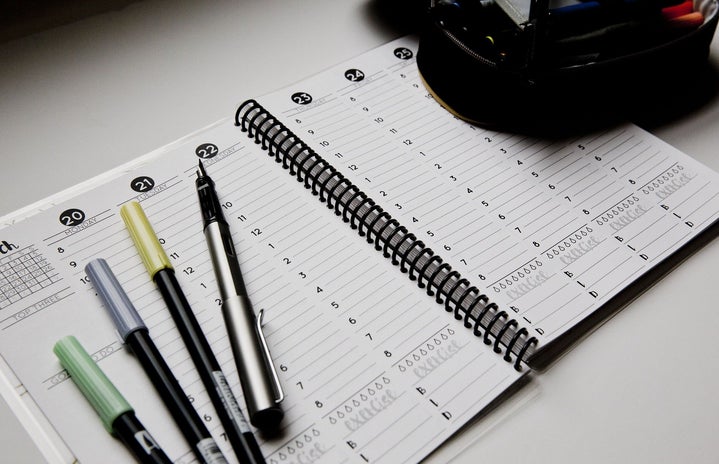Edited. by: Krisha Mansukhani
As those long summer days fade away and the school year begins, it’s important to stay organized in order to increase your productivity, save time, recognize relevance, and keep up with your school work. Developing organizational skills can help you stay on track with school as well as prepare you for the real. world. In addition, effective organization is a small factor that can assist you in staying focussed, remembering your assignments or exams, and raising your GPA. Staying organised is vital to a your well-being, happiness, and academic success as a student.
Here are three ways to improve your organization in order to be successful this school year:
1. Develop a Routine by Using a Planner
Consistency is the key to success. You can start to develop a routine by writing down your general weekly schedule in a planner or agenda. If you prefer to use your phone to keep track of your week, then you can always use apps like Google Calendar, ZenDay, Fantastical 2 for iOS, and Any.do. Utilizing a planner is a functional way to balance your work, academic career, social life, and personal life. Your weekly plans can include your homework, assignment due dates, club meetings, events, errands, appointments, when you exercise, the list goes on. Your plans for the week are visually set up for you, so that you can stay track with your deadlines and schedule your time effectively.
A planner can also help improve productivity. This is especially important in order to balance your personal and professional life. Being productive is not limited to school, it can include tasks like cleaning, doing laundry, meal prepping, or working on projects that keep getting put off. Regardless of the task, planners help you stay on track with what you hoped to achieve, and encourages you to move on to your next task efficiently and effectively.
Sometimes, it is not always possible to stick to a routine; however, by setting up a general framework of your week, it can help you stay focused and on track.
2. Break Down Big Tasks Into Smaller Tasks – Don’t Multitask
Often we ignore large tasks because it seems overwhelming or we may begin a big project, but leave it for another which results in multitasking. Multitasking may seem like a good idea because it serves as an illusion that you are working twice as hard. Nonetheless, multitasking and ignoring big projects can leave you disorganized and stressed.
When you break down big projects and tasks, they will seem a lot more manageable. Breaking down big projects can also make your next specific step more clear which will make you less likely to procrastinate.
Here is an example of how you can break down a large task. Instead of thinking about that multiple page essay you need to submit, you can break it down into smaller tasks like:
-
Read pages from textbook and other articles on the topic for research and make notes.
-
Write an outline. This can be in point form; an outline is a way for you to gather your ideas and evidence together.
-
Write the introduction.
-
Write the first argument.
-
Write the second argument.
-
Write a conclusion.
-
Proofread the essay. You can also get your peers or your teacher to look over your essay as well.
-
Make any corrections to the essay and format it.
-
Submit essay.
Hence, this strategy helps you organize large projects in order to increase your productivity while also preventing procrastination and the feeling of being overwhelmed. It also compels you to think logically of what needs to be done and in what order as well as staying on schedule.
3. Declutter, Declutter, Declutter!
Clutter attracts more clutter, decluttering your space at least once a week will keep you organized and focused. At the end of each week, look through all the papers, documents, notes, and things that you have accumulated in your workspace. Then, sort through each item and decide what is important and what is not.
The insignificant items can be thrown away while the important ones can be organized into files such as an accordion folder where each section can be utilized for a specific subject, homework, and more. In addition, an accordion folder, as opposed to regular folders, is useful in organizing many different things into one file which will save space on your desk and avoids any future cluttering.
Thus, decluttering can create a sense of confidence and efficiency — you see yourself as competent. It utilizes your problem-solving skills since you need to put an X amount of items in a Y amount of space. By achieving this effectively, it can help you feel confident in your decision-making skills which is a vital skill to have as you move on to the workplace. Decluttering and organizing your space can also reduce anxiety. When things seem to be out of order, it can make us feel confused and anxious; creating order and structure to your life can relieve that anxiety.
Hopefully, these tips inspire you to stay organized this school year in order to increase your productivity, stay focused, and complete your assignments on time, so that you can have a very successful personal and professional life.


